First you will need to find a game...

Start by clicking the Games tab at the right of the screen.
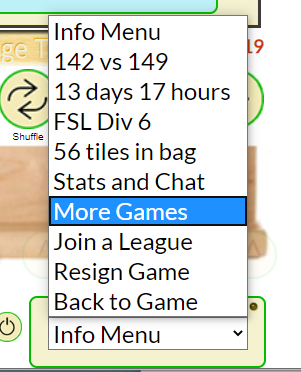
Start by selecting More Games from the Info Menu at the bottom right of the screen.
This will open the Games panel
[ try it ] where you can:
- [ Search ] for the type of game you would like to play among current offers.
- [ Invite a friend ] to play.
- [ Post an offer ] of a game for anyone else to accept or delete offers you have previously posted.
- Search for a specific player. [ try it ]
When you have played a few friendly games, you might like to join one of our
[ leagues ]
See also
[ Taking your turn ] and
[ Navigating your games ] and
[ The Rules of Scrabble ]
For help on other topics, use the menus at the top of this panel.
You are reading the help pages for a largesmall screen. If you use a tablet where PlayScrab displays differently in different orientations, you may need to refresh the screen to read the relevant information.
Search for Game Offers
The search panel is accessed from the
[ Games panel ]. It looks likes this
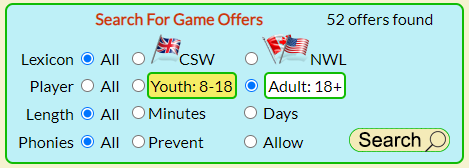 [ try it ]
[ try it ]The buttons allow you filter your search by lexicon, age of player, length of game, and whether phonies are allowed:
- Lexicon
Choose between CSW (Collins) or NWL (North American) word lists. See [ Dictionaries and Meanings ].
- Age of Player
In most cases, you will leave this setting on its default, which depends on your own age. See [ Child Protection ].
- Length
Select "Minutes" if you want to play an instant, real-time game or "Days" if you want to play in your own time over several days (up to a maximum of three weeks). See also [ Timing and Clocks ].
- Phonies
"Phoney" means a word that is not in the lexicon. If phonies are not allowed, they will be rejected immediately; there is no penalty and you can try as many words as you like. If phonies are allowed then words can also be challenged off the board. See [ Challenges ] for full details.
You select a game to play by
clickingtapping anywhere in the offer box.
The detailed settings for each game are shown on the offers when you search, as in these examples

- You can see the Elo rating of the player and so decide if they are a suitable opponent. See [ Ratings ] for more information.
- Hover your mouse over the offer to see when the player was last online in order to get an idea of when they might reply.The option to see when a player was last online is not available on the phone interface.
- Kong and Martin are both offering games with the international English lexicon. Alison is offering one with the North American lexicon.
- Kong is not allowing phonies, which also means no word challenges. Martin and Alison are both allowing phonies and challenges. In Martin's case, there is no penalty for an incorrect challenge, while if you play Alison, incorrect challenges cost 5 points.
- Neither Martin nor Alison are allowing players to check the validity of words before they play them. In Kong's case it is irrelevant because every word is checked automatically.
- Kong and Martin have set the maximum length of their game at two weeks. Alison wants hers finished in a week. In either case, the game will be automatically ended if the period of play expires. In that case, one or both players will have earned time penalty points. See [ Timing and Clocks ].
- All three players have disallowed resignation. Unlike say, chess, Scrabble players often do not like opponents quitting. They may be on track for a personal best score when they are thwarted by a resignation.
- All games on this site can be viewed by anyone who has the link to the game. If it's an important match with commentary, the commentators will need to be able to see the racks. In the vast majority of games, this is undesirable because of the possibility of cheating.
Invite a friend to play
There are three ways to do this:
 From the [ Games Panel ], clickingtapping on "Invite a friend to play" takes you to a split pane.
From the [ Games Panel ], clickingtapping on "Invite a friend to play" takes you to a split pane.
The upper half lists the game options you currently have selected. There is a button to change these settings. When you click tap it, all the options are explained in detail although you may wish to read [ Challenges ] and [ Timing and Clocks ]. Make sure to scroll down to the Save button when you make any chnges.
The lower half contains a form to type in your friend's name and email address and an optional message to them, then click tap the send icon  and they will automatically be emailed an invitation.
and they will automatically be emailed an invitation.
[ try it ]
Note that we do not retain your friend's contact details. See [ Privacy ]
- At the bottom of the page is a link you can copy and paste into a message to send to them e.g. by email. Make sure you copy the whole link. If you post this publicly, anyone who clicks it will start a game with you.
- In the same box is a link to invite Facebook friends. You can post it to your timeline or to specific friends or to small groups. As above, you are cautioned to choose carefully where you post it as every click on it will start a game.
Note: Invitation links expire after 10 days. This is so you can more safely post them online.
The
[ Settings ] logo

in the box at the foot of the screen allows you to adjust the features of the games you are offering. Make sure to complete all the fields and click the save button.
There is no limit to the number of games you can play, with the following exceptions:
- The number of friendly* games you can play with one other person is limited to 50 every two weeks
- The number of simultaneous friendlies with one other person is limited to two.
*"friendly" includes rematches
Post a Game Offer
From the
[ Games Panel ],
clickingtapping on "Post a game offer" takes you to a split pane.
The upper half lists the game options you currently have selected. There is a button to change these settings. When you
click tap it, all the options are explained in detail although you may wish to read
[ Challenges ] and
[ Timing and Clocks ].
The lower half allows you to choose how long your offer will be displayed for and then post it. If you do not choose a display time limit, each offer you post will be displayed every day until someone accepts it and then posted again the next day.
Your offers for games timed in days are posted only if you have played in the previous 24 hours. If you post offers for games timed in minutes, they are displayed only if you have played in the previous 5 minutes.
Deleting offers ClickingTapping
ClickingTapping the "Delete my offers" button will delete all your current offers. Your offers will also be deleted if you do not complete offered games when someone accepts.
Scrabble Leagues
Once you have played a few friendly games, you might like to join a league. Leagues are played in rounds, mostly lasting two weeks. To take part you need to register in your chosen league before the round starts. To access the registration details,
clicktap on the "Your League Registrations" box.
[ try it ]
This will display a set of panels describing the available leagues. If these are blue, you can
clicktap on them to register. If they are pink, you are already registered and can click on them to withdraw (ONLY before the round starts).


You can also see at glance which league(s) you are registered for by the ticks and crosses on the "Are you registered?" box.
The information in the league panels includes:
- The lexicon used, which may be the international CSW (Collins Scrabble Words) or the North American NWL (NASPA Word List, also known as TWL). This is also indicated by a flag:
 for CSW or
for CSW or  for NWL. See [ Dictionaries and Words ]
for NWL. See [ Dictionaries and Words ]
- When the next round starts
- The league format e.g. whether it's a single or double round robin and what the promotion rules are.
- There may also be restrictions on who can join.
When you click to register for a round, you will need to commit to completing the games in the round as it is no fun to be in a league where other players don't turn up to play! You will also need to validate your email address, if you have not already done so.
When you have registered, nothing will happen immediately but once the round starts all the games you have been allocated will automatically appear in the Games panel.
The leagues are arranged in divisions. New players start in the bottom (highest numbered) division and can win promotion by winning the most games. For details of how you are allocated to divisions (and why you might not always end up where you expect) see
[ Rankings and Promotion ]
Entry to successive rounds is
not automatic. You need to re-register each time you wish to play. This is especially important if you have finished among the top players in your division as promotion to the next division only happens if you play in the next round.
See also:
[ Results ] [ Hall of Fame ] [ Timing and Clocks ]
League Results
 The Results tab shows the current ranking for all players in a league division. It also allow other leagues, divisions and previous rounds to be viewed.
The Results tab shows the current ranking for all players in a league division. It also allow other leagues, divisions and previous rounds to be viewed.
By default, the results shown are in your own division. If you are playing in more than one league, the league and division shown by default relate to the game currently loaded.
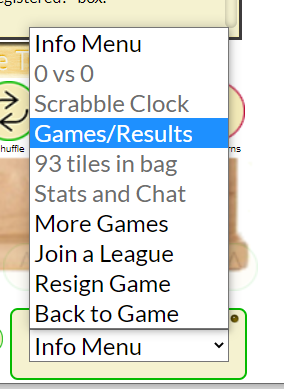 Select Games/Results from the drop down Info Menu. This brings up two panels: the right hand one is an index of leagues and divisions.
Click Tap
Select Games/Results from the drop down Info Menu. This brings up two panels: the right hand one is an index of leagues and divisions.
Click Tap on a division title in the Results panel to view games between other players.
The results tables are in three sections:
- A ranked list of players by games won and total margin so far.
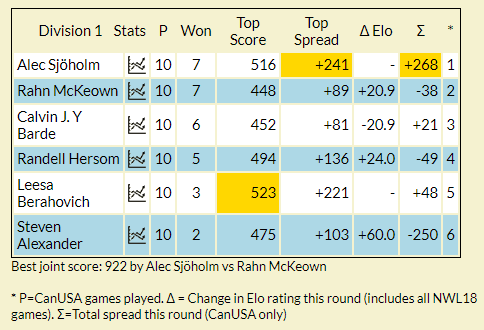
The best top score, top spread and total spread for the division are highlighted in gold. The row that pertains to you is highlighted in green.
Click Tap on

to view an individual player's historical stats.
- One or two tables of detailed game results depending on whether the league is single or double round robin format.
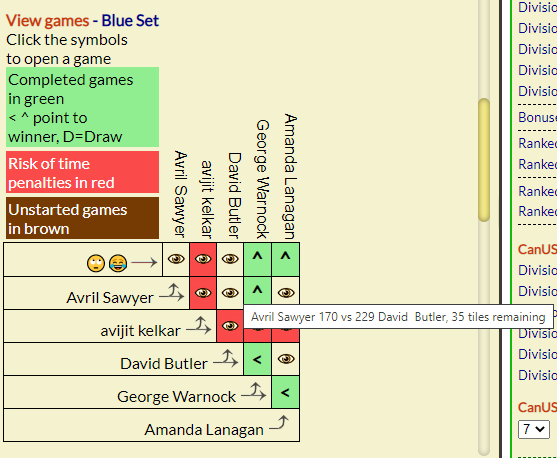 Click Tap
Click Tap on any game to view it. On a computer, hover over any game to see the current score and how many tiles remain to play. Completed games are shown in green with an arrow pointing to the winner. Unstarted games are shown in black and games in time trouble are shown in red.
- A table of links to historical head-to-head results between every pair of players.
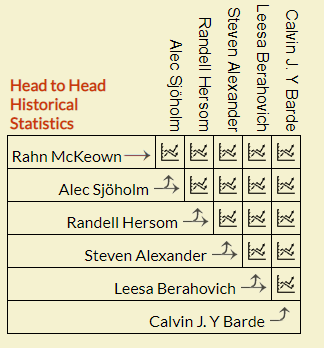
As well as linking to detailed results, the Results panel links to tables of bonuses (i.e. words played using all seven tiles from the rack), high scores, average scores and listings of players
[ Elo ratings ].
See also [ Statistics ].
League Rankings and Promotion
The process of assigning players to divisions is as follows:
- The size and number of divisions is determined, based on the number of registrants.
- Every player in a league has a rank calculated from their games in the most recent round they have played in:
- 20,000 for each win, where "win" is the actual number of games won less any game time penalties. [ See Timing and Clocks ]
- 10,000 for each draw
- +1 for each point scored
- -1 for each point scored by opponents
- The top three (FSL and TEN) or two (CanUSA and Patrons) players in each division are always promoted as long as they re-register for the next round.
- Newcomers are added to the bottom of the rank order in the sequence in which they registered.
- Players are allocated, bottom up, to the available places.
Things that can affect where you are placed:
- The algorithm that determines the divisions attempts to make the number of players as even across the divisions as possible and as close to 13 for FSL, 10 for TEN, 7 for CanUSA or 6 for Patrons as possible. Depending on the number of people who register, divisions may contain slightly fewer players. The changing size of divisions from round to round can significantly affect where you are placed.
- People above you dropping out can cause you to be promoted when you were not expecting it.
- People returning to play who were not in the previous round but are ranked higher than you can cause you to be relegated. Note that unlike tournaments in some other implementations of Scrabble, there is no deliberate process of relegating the bottom three. Relegation is just a natural consequence of how the numbers work.
- A promotion means being moved into a division above everyone who was in your division last time but not promoted. As explained above, players can sometimes move up a division without earning promotion; in this case those who actually win promotion will be promoted a further division.
Everyone in a division starts the round as equals. Neither Elo nor previous rank is taken into account. The only thing that matters is which division you are in.
In the very rare event of a tie in wins and margin, the tie-breaker is the rank order in which the players completed the previous round.
There is no rank penalty for skipping rounds apart from unclaimed promotions lapsing.
Hall of Fame
Access the Hall of Fame by
clickingtapping on the

tab at the top of the board.
Currently a Hall of Fame exists only for FSL. This will soon be re-written and expanded - as will this help page!
Taking your turn
At each turn you can play (see below),
[ pass ] or
[ exchange ] and you may be able to
[ challenge ] your opponent's word.
Words are read left-to-right or top-to-bottom. The first word played must pass through the central square of the board. All subsequent words must connect horizontally or vertically with words already played and wherever letters touch, valid words must be made. "Valid" means they are in the selected
[ lexicon ] for the game.
See also
[ Arranging your rack ]
Play
Step 1Click Tap on a starting square on the board. This will show an arrow indicating direction of play.
 Click on Tap
Click on Tap it again to change direction.

You may find it easier to change direction by
clickingtapping on the larger

or

buttons.
Step 2Place letters from your rack by
clickingtapping on them
or by typing on your keyboard. See below for how to play a
[ blank tile ].
If you change your mind, withdraw your letters by
clickingtapping on
 or press the "Backspace" or "Delete" keys on your keyboard
or press the "Backspace" or "Delete" keys on your keyboard or use the

button to delete letters one by one.
Step 3To send your move to the server,
click tap on
 or press the "Enter" key on your keyboard
or press the "Enter" key on your keyboard, which will then change to

, giving you a few seconds to change your mind and undo your move. See also
[ Navigating your games ]
During Play
The score for a word you are entering appears as you type it.

You can check the detail of how your score is made up without committing to playing it by
clickingtapping on
 or pressing /, ?, # or = on your keyboard. If the game [ settings ] permit, this button also validates whether the word is in the chosen [ lexicon ]
or pressing /, ?, # or = on your keyboard. If the game [ settings ] permit, this button also validates whether the word is in the chosen [ lexicon ]
Note: not all of these shortcuts work on all keyboards.
Your play is automatically validated for legality (i.e. whether it connects with other letters on the board). In games where phoneys are disallowed the word is validated against the chosen
[ lexicon ]; if it is invalid (a "phoney") the play will be refused and you can try another word without penalty. In other games, it is not validated against a dictionary unless
[ challenged ].
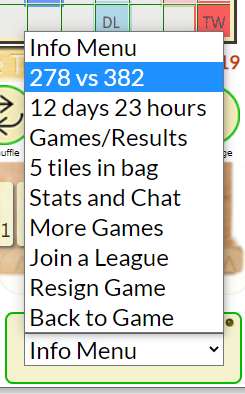
As well as being detailed in the Scores panel, your opponent's most recent play is highlighted with tiles in a contrasting colour.
To access the Scores panel, select the current score from the Game Info menu. See also
[ Game Info ]
See also
[ Passing and Exchanging ],
[ Blank Tiles ],
[ Challenging ],
[ Navigating your games ] and
[ Game Info ].
Tile Tracking
The Tiles
tabpanel, accessed by selecting "tiles in bag" from the Info Menu tracks unseen tiles.
Arranging your rack
Choose from
sixfive ways to arrange the tiles on your rack:
Randomly
shuffle the letters on your rank by
clickingtapping  or by pressing the space bar on your keyboard
or by pressing the space bar on your keyboard.
Arrange them into
alphabetical order by
clickingtapping  or by pressing the "Tab" key on your keyboard
or by pressing the "Tab" key on your keyboard.
Spell out the word you want by clicking the tiles in turn or simply by typing it.
To move individual tiles on the rack...
Either Drag and drop them within the rack
OR Click Tap the letter you wish to move then
click tap the left and right arrows that appear
or use the arrow keys on your keyboard.

To deselect the letter,
click tap it again.
Or first select an insertion point by
clickingtapping a caret underneath the rack. e.g.

then
click tap or type the tile you wish to move to that spot. To turn off the insertion point,
click tap it again. Note that the rightmost insertion point is marked with a keyboard icon

;
clickingtapping this point enables you enter your word by
clicking or typingtapping each letter in turn.
When finished, if you wish to
save the arrangement,
click tap on the green tick that appears in the exchange tray.
Tip: if all you want to do is record ideas for when you come back to play, use the
[ Notes ] feature instead.
Blank Tiles
Blank tiles can be used to represent any letter you choose.
To play a blank tile,
either type the letter you want or click tap on the blank and then
click tap on the letter in the tray that pops up.
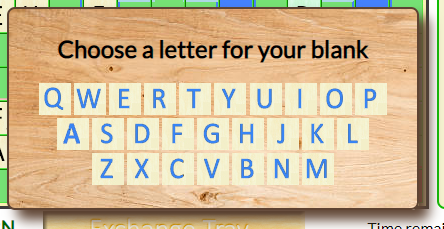 Sometimes the word you are playing will have two letters the same and you want to play the blank as the first of these. In this case either press the shift key as you type the letter or click on the blank; otherwise, if typing, the non-blank will be selected first.
Sometimes the word you are playing will have two letters the same and you want to play the blank as the first of these. In this case either press the shift key as you type the letter or click on the blank; otherwise, if typing, the non-blank will be selected first.
Challenges and Phonies
Note that the screen background helps you quickly distinguish games in which phonies and challenges are allowed.
 | |  |
| Allowed | | Not Allowed |
To challenge your opponent's latest move,
click tap on

.
Note that this icon does not appear in games where phonies are not permitted; in those games, the computer will prevent you playing a phoney and allow you to try another word without penalty.
A "phoney" is a word that is not in the chosen
[ lexicon ] for the game. A player can "challenge" when they believe their opponent has played a phoney. If a challenge is successful, the letters are returned to the rack and the person who played it loses a turn. If a challenge is incorrect, there may or may not be a penalty for the challenger. By default, phonies are allowed in PlayScrab and incorrect challenges incur a 5 point penalty.
Phonies can be automatically prevented (also known as "void" challenge) or the penalty for an incorrect challenge changed in
[ Game Settings ]. In the examples that follow, the default settings are assumed.
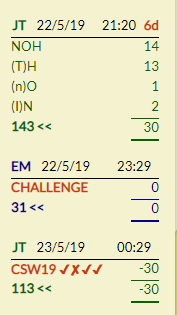
In this example, player JT has played the letters NOH, making the words, NOH, TH, NO and IN. For this she scored a total of 30, bringing her score to 143.
Her opponent, EM, challenged. This had no effect on his current score of 31.
The words were validated. NOH, NO and IN were all correct but TH was invalid. This is indicated by ticks and crosses corresponding to the order of the words as listed. Therefore the turn was disallowed, the 30 points were subtracted, her turn was lost and the letters returned to her rack.
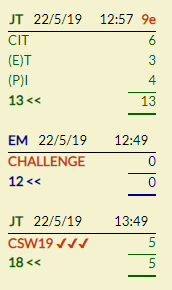
In this example, JT has played three valid words and EM has incorrectly challenged. As a result, JT's score is increased by 5 penalty points and her letters remain on the board. EM can continue with normal play - his turn is not lost.
Had the
[ Game Settings ] been different, EM might have incurred a 10 point penalty or no penalty at all ("free" challenge"), lost his turn ("double" challenge) or been unable to challenge because the server would have prevented JT from playing any phonies ("void" challenge).
Passing
To pass your turn,
click tap on

Note that four passes in succession will bring a game to an end. See
[ Ending a Game ]
Exchanging
Turn on exchange mode by
clickingtapping either the "go fish" icon or the exchange tray.


When in exchange mode, the tray will go pink.
Select the letter(s) you wish to exchange by
clickingtapping on them
or typing or by dragging and dropping them into the exchange tray.. Note that if you use drag and drop, exchange mode will turn on automatically.
If you change your mind about a letter,
click tap on it in the tray and it will return to the rack or drag it from the tray back to your rack.
If you change your mind entirely,
click tap on

This will return the letters to your rack and switch off exchange mode.
When you're happy with your selection,
click tap on the "go fish" icon

Note that if you have already placed tiles on the board, you need to withdraw them by
clickingtapping on

before you can exchange.
Note that six successive turns with zero score will bring a game to an end. This is any combination of passes, exchanges and successful challenges. See
[ Ending a Game ]
Note that
solitaire games are limited to three exchanges in total.
Ending a Game
There are seven ways a game can end:
- In games where [ phonies ] are not allowed, the game ends when the tile bag is empty and so is one player's rack, having played a final word. (See [ Tile Tracking ])
-
In games where phonies are allowed, the tile bag is empty and so is one player's rack, the other player will be given an opportunity to [ challenge ] the final word or select to end the game.
- Games end automatically when there have been six non-scoring plays in succession (passes, exchanges or successful challenges).
- Games end automatically when there have been four passes in succession.
- Every game has a [ time limit ] either for individual play or for the game or tournament as a whole. The game will end when the time limit expires, possibly incurring time penalties for one or both players.
- The game can be stopped before it starts by clicking
 .
.  selecting "Leave Game" from the Info Menu below the board. This is only available in non-league games where no moves have been made.
selecting "Leave Game" from the Info Menu below the board. This is only available in non-league games where no moves have been made.
-
By default, resignation is not allowed but this can be changed in the [ game settings ]. If resignation is allowed, it is done by clicking
 .
.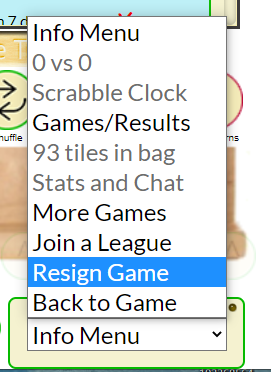 selecting "Resign Game" from the Info Menu below the board. A player who resigns in a losing position will receive a penalty of 40 points on top of any accrued time penalties. A player who resigns in a winning position will be penalised by as many points as it takes to put them one point behind and therefore lose.
selecting "Resign Game" from the Info Menu below the board. A player who resigns in a losing position will receive a penalty of 40 points on top of any accrued time penalties. A player who resigns in a winning position will be penalised by as many points as it takes to put them one point behind and therefore lose.
Note that
Solitaire games do not end with passes. Instead they can always be ended by
clicking the Leave buttonselecting "Leave Game" from the Info Menu below the board, if desired.
At the end
The app calculates countback (the value of tiles remaining in either or both players' racks). If both players have countback, the relevant points are deducted from each. If only one player has countback, they also receive their opponent's countback as a bonus.
The app also calculates any
[ time penalties ].
After the game
After the game has ended, a number of things happen:
- Both players are given the opportunity to ask to play again by clicking Rematch. Whether or not the orginal game was a league match, the rematch will be a friendly and regardless of the original settings, resignations will be allowed in the rematch. Other than that, the settings for the the new game will match the original. The person who asks for the rematch will play second, if the other player accepts.

 If challenged to a rematch, you are free to accept or decline. Even if you accept, you can still withdraw without penalty until the first word has been played by clicking the Leave buttonselecting "Leave Game" from the Info Menu below the board. .
If challenged to a rematch, you are free to accept or decline. Even if you accept, you can still withdraw without penalty until the first word has been played by clicking the Leave buttonselecting "Leave Game" from the Info Menu below the board. .
- The "Tiles" tabitem in the Info Menu changes to "Words" and clickingselecting it open a panel listing all the words played and their definitions. [ See Dictionaries and Meanings ]
- Your ΔElo for the current ratings period is updated. [ See Ratings ]
Navigating your games
As you play your games, the "Play" button at the bottom right of the screen changes in appearance and function:
 | Challenge mode If [ challenges ] are allowed, this will show when it is your turn. Clicking it will challenge the word(s) your opponent played. Once you place a tile on the board, it will change to... |
 | Play mode Once you have placed tiles on the board, play mode becomes active. Clicking it sends your move to the server. Once clicked, it changes to...
|
 | Undo mode This gives you a few seconds to change your mind and withdraw the move by clicking the button. The amount of time you allow yourself can be adjusted in [ Game Settings ]
[ try it ]
|
 | Next Game
Clicking this will take you to the next game in which it is your turn. You can change the order in which games are displayed in [ Game Settings ]
[ try it ]
See below for how to view other games or play games out of sequence.
|
 | No more turns left to play. You can start a [ new game ] or you can view completed games or the games in which it is your opponent's turn. See below.
|


Games in play and those completed in the last two weeks, are show as "cards" in the games panel. The games panel is accessed from
the Games tabGames/Results in the Game Info dropdown.
Games are initially shown in truncated form.
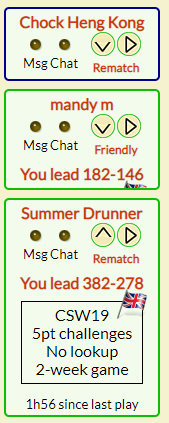
To expand them to see more information,
click tap once or twice on

. The illustrations show the three stages of opening the detail.
For current games, the detailed view shows the current score, the time since last play so you can keep an eye on potential time penalties and the details of the type of game such as the lexicon in use and league round if appropriate.
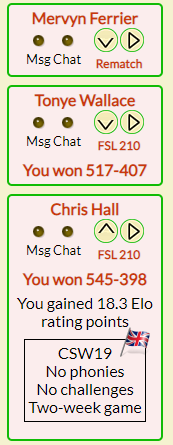
For completed games, the detailed view shows the result, including countback and time penalties and the effect on Elo ratings.
Click Tap on

to open a game to play or view it.
Note that you can change the way your games are sorted in the
[ Settings ] tab.
See also
[ Taking Your Turn ]
Membership
PlayScrab is
not free. It carries no advertising and relies entirely on its membership for support. It is kept as low cost as possible to allow everyone to play. The great majority of members also become donors or patrons. By doing so, you are both helping poorer players to keep playing and you are helping keep PlayScrab alive. It cannot survive on membership fees alone.
There are four classes of player:
Guests are players who have not yet subscribed. Think of it as a trial period. Guests may play up to ten friendly games before subscribing. Also, they can join the FSL or CanUSA leagues and play there for free until they win promotion.
Members are players who have subscribed the minimum of £5 per year. Members can play an unlimited number of friendly, FSL, and CanUSA games.
Donors are players who have donated any amount over the basic £5 in the past year. In addition to member benefits, Donors can play unlimited INSTANT 5+5 games. Players who have received gift vouchers are also classed as Donors.
Patrons are players who donate £50 or more a year. In addition to donor benefits, Patrons are eligible to compete in the Patrons League.
If you wish to upgrade your membership, go to
[ Subscribe/Donate ]. Don't worry that the payment link says "Subscribe". If you are already subscribed, the system will add your contributions together and accept you as a Donor or Patron.
Timing and Clocks
PlayScrab has two different kinds of timing structures.
- Games timed in minutes are intended to be played live; each player has a total amount of time in which to take all their turns and it is up to them how they organise it.
- Games timed in weeks can be played by opponents who are not online at that same time; they might be in different time zones.
In the latter case, time restrictions are quite relaxed and in most cases you can complete games without any time stress.
The various time limits can be changed in
[ Game Settings ]. The available values are between 10 and 40 minutes per player or one, two, three or four weeks for the entire game.
Players who exceed the time limits may incur penalties.
- In the case of minute games, the penalty is 10 points per minute of overtime and then forfeiting the game if overtime is exceeded. The allowable overtime can be selected in [ Game Settings ] from 1, 2, 3, 5 or 10 minutes.
For these games, a Scrabble clock
 is displayed showing each player's remaining time. It changes colour to red when a player is in overtime.
is displayed showing each player's remaining time. It changes colour to red when a player is in overtime.
- In the case of one week or longer games timing out, penalties will be applied according to how long each player took between turns. For one-week, ten-day and two-week games, a player can wait 12 hours to play without risking a penalty. For three-week and four-week games this is 24 hours.
After that, penalties are accrued at the rate of 1 point per two hours for one-week and ten-day games or 1 point per three hours for longer games. Note that these accrued penalties are applied only if the game times out.
| Length of Game | "Free" period | Penalty rate after that |
| One Week | 12 Hours | 1 point per 2 hours |
| Ten Days | 12 Hours | 1 point per 2 hours |
| Two Weeks | 12 Hours | 1 point per 3 hours |
| Three Weeks | 24 Hours | 1 point per 3 hours |
| Four Weeks | 24 Hours | 1 point per 3 hours |
- In the case of league games that time out and incur penalty points, additional Game Penalties are assessed to reduce the number of wins counted for [ ranking and promotion ] purposes. Game penalties (GP) in a given round of a league are calculated as follows:
- Penalty points in each game contribute to a total for a player if either the opponent had no penalty points or if both players did and the individual's points exceeded 12.
- GPa = 0.4 x the player's total, rounded down the nearest integer.
- GPb = 0.8 x the number of games in which penalty points were accrued (regardless of how few).
- GP is then the lesser of GPa/10 or GPb.
Note that where players are completing qualifying games in order to enter a league, games that time out do not count and games where they are penalised by 75 points or more count as -1 game. This is applied even to league games so it is possible to enter a league, allow games to time out and thus be prevented from re-entering.
Click Tap on the

tab above the board to see live updates of times and potential time penalties as well as details of the time and penalty regime for any specific game you are playing.
Game Info
Players
Whether it's
YOUR TURN or
HIS/HER TURN is shown below the board to the left. There is also a shadow under the name of the player whose turn it is in the heading.
The player named first in the heading is the player with the first move. Throughout the game controls, their information is shown in
blue. The other player is shown in
green
See also
[ Player Info ]
Scores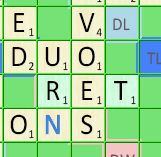
The Score
tab to the right of the boardpanel, accessed by selecting the current game score in the Info Menu below the board, shows all moves played in the current game, including scores for each word and running totals. It uses international conventions for showing Scrabble moves. These are best explained with an example.
In this example, the player has placed the tiles R and T, making the words RET and URN.
In the Score panel, her score is shown as
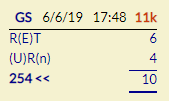
- The text is in blue, indicating she went first in the game.
- "GS" is her initials.
- She played the move at 17:48 6/6/2019. The time is displayed according to the timezone of the player viewing. The date is formatted using British conventions i.e. dd/mm/yy.
- The play was horizontal starting at row 11, column k. By convention, rows are counted 1-15 from the top and columns are lettered a-z from the left. Horizontal plays are shown number (i.e. row) first and vertical plays are shown letter (i.e. column) first, thus it is shown as 11k. Note that this conventional reference for the starting square also appears below the board when you click on a square.
- The E, U and N were all already on the board. This is indicated by placing them in brackets.
- The N was a blank. This is indicated by showing it in lower case.
- RET scored 6 points, URN scored 4 points, for a total of 10. This is added to her previous score (not shown) for a running grand total of 254.
Tile Tracking
The Tiles
tabpanel, accessed by selecting "tiles in bag" from the Info Menu tracks remaining unseen tiles.
See also
[ Tiles and Rack ]
Chat
New chat messages are indicated by a lit LED

vs. an unlit one
 in the game card within Games panel and on the Chat tab when it's the current gameon the Info Menu box below the board. Select "Stats and Chat" from the Info Menu to open the chat panel
in the game card within Games panel and on the Chat tab when it's the current gameon the Info Menu box below the board. Select "Stats and Chat" from the Info Menu to open the chat panel. Please note that other players and admins have access to the chat so don't say anything you don't want generally known! See also
[ Chat ]
Ratings
Click Tap on

in the Score panel to view the
[ Elo ratings ] consequences of a win, loss or draw.
Player Information and Statistics
In general, all information about or from the player with the first move is shown in
DARK BLUE and all information about or from the other player is shown in
DARK GREEN.
Access player info by selecting "Stats and Chat" from the Info Menu below the board.
On the left hand side of the screen, below each of your pictures,Below each of your pictures is shown your
[ Elo ratings ] and links to other statistics for both of you.
Under your opponent's photo their local time is shown to help you decide whether to expect a return play or not. Between 7am and 11pm, this is shown in daytime colours
 13:24
13:24
Between 11pm and 7am, this is shown in nighttime colours
 23:06
23:06
Under your photo, an LED shows whether you have a
[ message ] set.

if you have,

if you haven't. This is to remind you to remove out-of-date messages in the Settings tab.
Any status message from your opponent is in italics running across the top of the screen, in a colour to match the way their name is displayed.
The icon

is shown three times.
ClickTap the one under your picture to see your detailed stats such as best score, best word and so on. The one under your opponent's picture shows the same stats about them. The one under both your pictures shows your head-to-head record.
Message, Chat and Note (scroll down for chat and note)
A
message 
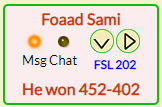
is a short statement (up to 110 characters) you can make that is visible to all your opponents. Perhaps "Good luck to all" or "I'm away until Wednesday. I'll play you when I return". On your opponents' screens, this appears across the top of the game board, above your names. The fact that you have posted a message is also indicated by a light on your games cards as they appear to your opponents
(select Games/Results from the Info Menu to display games cards).
Update your "Message" to let other players know you will be offline for a while or just to greet them. The option to do this is in the
[ Settings ] tab at the top of the board.
You set a message and delete it using the Settings tab or by
clickingtapping on the "message" LED under your photo.
When you have posted a temporary message, the LED under your photo blinks to remind you delete out of date messages.

If, instead, you save a permanent greeting, the LED will light to indicate you have a message set but will not blink.
 Chat
Chat is communication between you and specific opponents.
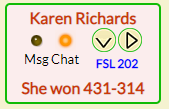
You can chat during and even after a game, whether or not it is your turn.
When you have an unread chat message, a lit LED is shown on the game card in the Games
tabpanel, accessed by selecting Games/Results from the Game Info menu. The Game Info menu itself also has a lit LED..
When you open a game with an unread chat, the Chat tab opens by default.
The last message is marked as read when you either reply or take a turn.
Remember, chats are
visible to anyone including admins. Do not do or say anything you are not happy for others to see. If you are uncomfortable with a chat, please click
REPORT
. See also
[ Security and Child Protection ]
A
note is a short note you make to yourself about a specific game, typically to record good plays you have spotted.
Click Tap on

icon to open the notepad. Type your note and
click tap 
to save it.
When you have made a note, it will open automatically every time you open that game until you

delete it.
Dictionaries and Meanings
Three English-language word lists are available:
 CSW, also known as Collins or SOWPODS, is the word list used throughout the world apart from North America. It is symbolised here by the British flag.
CSW, also known as Collins or SOWPODS, is the word list used throughout the world apart from North America. It is symbolised here by the British flag. -
 NWL, also known as TWL, is the much smaller word list used in North American tournament play. It is symbolised by the Canadian and US flags.
NWL, also known as TWL, is the much smaller word list used in North American tournament play. It is symbolised by the Canadian and US flags.
-
 NWL20 is the most recent update to NWL and is smaller again by a further 258 words deemed to be racial or religious slurs. A vote among players in the [ CanUSA league ] narrowly decided to retain NWL18 as the lexicon in that league.
NWL20 is the most recent update to NWL and is smaller again by a further 258 words deemed to be racial or religious slurs. A vote among players in the [ CanUSA league ] narrowly decided to retain NWL18 as the lexicon in that league.
To help keep the distinction between CSW and NWL games, in case you play both, the borders of the board and various panels change according to the lexicon.
 CSW games show the borders in green by default
CSW games show the borders in green by default
 NWL games show the borders in red by default
NWL games show the borders in red by default
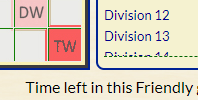 French games show the borders in blue by default
View the definitions of the words played
French games show the borders in blue by default
View the definitions of the words played
If phonies and challenges are disallowed in the game you are looking at, you can view the definitions of words in four ways:
- ClickTap on the dictionary icon and type the word into the search box that appears then clicktap "Search"
- ClickTap on any tile that has been played and definitions will be displayed of all words formed when that tile was played
- For a specific played word, hover your mouse over, or clicktap the word in the Scores panel, accessed by selecting the current score in the Info Menu. Note that the illustration is as the panel is seen on a computer screen (see [ Game Info ]). Note that clickingtapping a word in the Scores panel will also trigger the [ Step-Through Mode ]
- The methods above are suppressed for games in which [ challenges and phonies ] are permitted but once the game is over, the Tiles panel (see [ Game Info ]) changes to a Words panel and gives an alphabetical list of all words played, along with their definitions and this workds for all games.
Not all the definitions are as perfect as we might wish (understatement!) If you would like to contribute an improved definition, please post it in the
PlayScrab Facebook Group
Reviewing a Game
You can step through a game play by play or jump to any point in a game by clickingtapping a word in the [ Scores panel ]. This will highlight the word on the board, display the [ definition ] and the score for the turn. It will also fade out all words played subsequently to show the state of play at the time more clearly.
To return the board display to normal, clicktap on the Reset icon.
Elo Ratings
Elo is a statistical approach to inferring the relative ability of players who may never have played each other by counting the results of the games they have played against others in the same cohort. The system is named for its inventor, Arpad Elo.
Elo is used in PlayScrab for information only. It is not used to determine
[ league rankings or promotions ].
There are two ratings periods a month.
Base ratings are adjusted at 10am UK time on the 1st and 15th of each month by adding or subtracting each player's ratings change "ΔElo" during the preceding period.
Every player is assigned a rating of 2500 when they join. The starting value of 2500 was selected to clearly distinguish our ratings from those of WESPA, ABSP and our own previous system. Note that what matters in Elo is the difference between two players' ratings, not the absolute value.
Elo ratings above 2900 and below 3000 are labelled
Expert . Elo ratings of 3000 and above are labelled
Elite . Otherwise, ratings are labelled
Rated or
Unrated if they are beginners on PlayScrab (which, of course, does not mean they are not expert Scrabble players!)
Under the Elo ratings system, the winner of a game gains a number of ratings points and the losing player loses the same number. The number of points won or lost depends on the difference between the ratings of the two players; a player will gain more points by beating a higher-rated player than by beating a lower-rated player.
In the case of a draw, the lower rated player wins points from the higher rated player, but fewer points than if she had won the game.
The value of each game is based on the players' ratings at the start of each ratings period. At the end of the period, the points won and lost on each game are added up and the players' ratings are adjusted. Note the period in the which game ends determines the base rating used, thus the ratings value estimated at the beginning of a game may not be the value eventually applied.
The difference between two players' Elo ratings implies an expectation of how often each of them will win when playing each other. Under the system we use:
- a player with a rating of 1000 more than her opponent is expected to win 92% of the time.
- a player with a rating 500 more than his opponent is expected to win 77% of their games
- a player with a rating 50 more than her opponent is expected to win 53% of their games.
If you know about Elo, you might want to know that we use K=24 for all players and a 10
1/953 ≈
e1/83 logistic curve. The K value was selected to be sufficiently responsive to current games to give interest to the ratings but not so sensitive as to make the numbers jump around erratically. The logistic curve was carefully calculated to optimise its predictive power based on the actual results of the quarter million games in our database.
You might be interested in the strong correlation between the Elo Ratings and the
[ time-weighted mean score per turn ] used on PlayScrab, as shown in this chart where mean score is on the vertical axis and Elo along the horizontal.
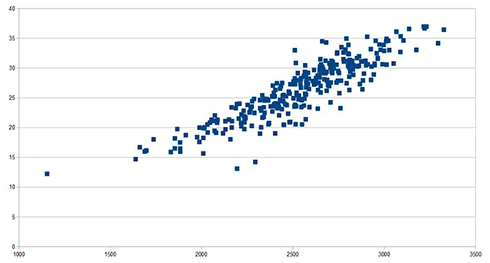
If you want to learn the technical details about Elo, Wikipedia has a
good article.
Note: the ratings system is named for its inventor, the Hungarian American physics professor and chess master,
Arpad Elo. It should not be confused with ELO, the 1970s rock band from Birmingham.
Average (Mean) Score per Turn
Mean scores are presented in two ways: a "base" figure that is revised once per ratings period and a running figure for the current ratings period, which is updated after every game
At the end of every game, as long as both* players scored 57 or more, the score and number of turns taken by each player is recorded. The score includes countback and time penalties and the number of turns includes passes, exchanges and challenges. This enables a running average (arithmetic mean) score per turn to be calculated for each player for the current ratings period. Ratings periods change on the 1st and 15th of each month at 10am UK time.
In order to show progress, PlayScrab uses a time-weighted figure for the "base" mean score. At the end of a player's second ratings period all scores to date weight equally. From the third ratings period onwards, the new base is calculated as 70% of the old base plus 30% of the running mean. This means that after three months. the first two week period is counting for only 12% of the figure; by six months it is down to 1.4% and after a year it is present only in homeopathic dilutions.
You might be interested in the strong correlation between the
[ Elo Ratings ] and the time-weighted mean score per turn used on PlayScrab, as shown in this chart where mean score is on the vertical axis and Elo along the horizontal.

* Solitaire games don't count.
Settings
The Settings tab, above the board, gives access to settings in five categories: Message, Game Settings, Account Settings, Password and Info
Message allows you to place a [ message ] over the board to be seen by all your opponents.
Game Settings allows you customise your board and tiles, change the way your racks are sorted and change the way waiting games are sorted and how they appear in the Games panel. You can also change the appearance of vowels in the tile tracking, adjust the length of time you have to undo a move, select your default [ lexicon ], adjust the various [ phonies and challenge ] settings as well as [ time limits ] and whether resignations or spectators are allowed.
In Account Settings, you can update your email address and adjust how it's used. You can also decide whether or not to display your timezone and even change your name, gender and the pronoun you prefer. Here is also where you can upload a new photo. Photos should ideally be square and 90 x 90 pixels.
The last two sections are for changing your password and advising you how other players see your timezone, giving you the opportunity to correct it.
Sound
Clicking the Sound button turns on or off a brief, appropriate but random audio comment by Simon Anthony of the
Cracking the Cryptic YouTube sudoku and puzzles channel. When the sound is on, Simon's comment is activated when you close the pop-up that tells you if you've won or lost a game.
Warm thanks to Simon for permission to use his voice and to Andrea of the
Simon Says website for their permission to use their audio clips and for inspiring the idea.
 | Sound is off. Click to turn it on. |
 | Sound is on. Click to turn it off. |
Sharing a Game
Maybe you want to show off an excellent play; maybe you want to report suspected cheating to an admin; maybe you want to analyse a game to see what you missed; maybe you are inviting spectators to an exhibition game...
 Click
Click  Tap
Tap the

button in the Scores panel
accessed by selecting the current score from the Info Menu dropdown, to obtain a URL to show the game to others. Copy the URL and send it by any means to your friend or post it online.
Viewers of other players' games cannot chat, make plays or see either player's settings but they
CAN see what has been said in chats, as can admins. In live games, viewers cannot see either players' racks unless "spectator mode" has been selected in the
[ Game Settings ].
Exporting a Game
Completed games can be downloaded in John Chew's
.gcg format by
clickingtapping the

button in the same panel. You can use .gcg files to animate and publish games in
Cross-Tables and to analyse games in
Quackle. The .gcg files contain full rack information from evey turn.
Etiquette
- Play nice. Chat nice.
- This site is for humans who want to play Scrabble against other humans, not computers, so do not use any anagram software or similar.
- Obscene, sexual and racial slur words etc are all fine on the Scrabble board if they are in the lexicon but in chat, on the group page and in all other forms of communication, keep it polite and respectful, bearing in mind that we have players from a wide range of cultures, religions and ages.
- Remember, all plays and chats are visible to anyone including admins. Do not do or say anything you are not happy for others to see.
- Do not make accusations of cheating either privately or in public. The correct course of action is to use the
 button in the Scores panel (see [ Sharing a Game ]) to obtain a public URL for the game and send it to an admin for them to take action if they feel it is appropriate. Note that admins take the breaking of this rule very seriously. One of the founding principles of FSL, for which this app was originally built, was to escape the negativity and accusations that beset other Scrabble communities at the time.
button in the Scores panel (see [ Sharing a Game ]) to obtain a public URL for the game and send it to an admin for them to take action if they feel it is appropriate. Note that admins take the breaking of this rule very seriously. One of the founding principles of FSL, for which this app was originally built, was to escape the negativity and accusations that beset other Scrabble communities at the time.
- Registering to play in a league under more than one account is unacceptable.
- Do not register to play in a league unless you expect to be able to play and complete all your games within the time limit.
If you have registered and then realised you will not be able to do this, please withdraw before the tournament starts. Similarly, do not start non-league games unless you intend to play them to completion.
Note that breaking any of these rules (possibly except the last*) may be subject to penalties as admins feel appropriate. This may include one or more of
- A warning
- A demotion in league rank
- A temporary ban
- A permanent ban.
Banned members are not entitled to refunds of subscriptions.
* The app already penalises players who register but do not play so there is no need for admins to get involved unless the player does this repeatedly.
See Also [ Security and Child Protection ]
Security
Chat should be fun and friendly. Chats are visible to anyone who looks at your game; this is deliberate to encourage players not to say anything they wouldn't be happy for everyone to see.
If you ever feel uncomfortable with a chat, please
click tap REPORT
. Your chat will be quickly viewed by a human who will take appropriate action, up to and including a lifetime ban. In particular, do not put up with (unfounded!) accusations of cheating, unwanted sexual advances or begging for money.
You can always turn off chat entirely if you prefer. Of course, never give a stranger personal info they could use to scam you such as passwords, mother's maiden name, first pet's name etc.
Please don't be alarmed by this section; most of the things described here have never happened on PlayScrab - but they do happen often elsewhere and we don't want them to come here.
Child Protection
For security, players under 18 cannot select offers from adults. Adults are only permitted to accept offers from young players if they are that player's parent, guardian, teacher or mentor. Adults are not permitted to join Youth leagues. Youngsters are, however, free to join adult leagues. Note that when adults and youngsters play each other, in-game chat is disabled and neither can see the other's photo. Moreover, the child's real name is not revealed.
Players who apply for a youth account are vetted by humans to ensure they really are under 18. We cannot offer similar protection for young people who sign up for adult accounts and there is no validation to prevent them doing so.
See Also [ Etiquette ] and
[ Privacy Policy ].
Logging out
Unless you share your computer there is really no need to ever log out. If you do want to,
click on the  icon at the top right of the screen.
tap the
icon at the top right of the screen.
tap the  icon in the centre below your rack.
icon in the centre below your rack.
The Rules of Scrabble
If you are looking for the basic
rules of Scrabble, this link takes you to the Hasbro site. The only differences from this site are
- They refer to "bingos" where we (the rest of the world outside North America) call them "bonuses".
- We allow ties; we do not apply their Rule #10 of Game Play
Improve Your Scrabble
If you want to play better Scrabble,
The Scrabble Players' Handbook is a fantastic resource, written by 12 of the world's leading players. We are proud that several of them play their online Scrabble here. Also, check out Kenji Matsumoto's
Breaking the Game website on winning at Scrabble.
Warm thanks to...
- Karen Richards for creating the Youth Programme and bringing hundreds of youngsters to the game, along with fellow youth mentor Chock Heng Kong.
- Dave McKeeman, former police officer specialising in internet child abuse, for helping formulate our child protection policy and auditing the site against it.
- Simon Anthony of the Cracking the Cryptic YouTube sudoku and puzzles channel for permission to use his voice and to Andrea for permission to use the audio clips they made for the Simon Says web app.

- Lily Style for her skillful design input, especially her excellent rendering of the PlayScrab logo . (Not much of what you see now is hers; that's because I have a host of technical changes to make to implement her great ideas.)
- Bob Brooks for endless practical help in managing the Facebook User Group and making newcomers feel welcome there and for endless moral support, in particular nagging me to implement the Patrons system.
- Jo Taylor, Elisabeth Jardine and Rick Blakeway for the help they give to newcomers to the site seeking support and the help they give me in testing the site and not letting me get away with anything.
- Adam Kretschmer, creator of the Adelaide Online Scrabble League and the UK Online Scrabble League, forerunners of FSL. Without Adam this site would never have existed. In a sense, Adam is the grandfather of PlayScrab. The clever algorithm he wrote for fairly assigning league games is still at the heart of the PlayScrab code (although long since converted from his Excel formulae to Perl scripts).
- Daniel Stembridge who set up the FSL Facebook group, which became the PlayScrab User Group, and did so much in the early days to entertainingly promote the league and the site.
- All the wonderful Patrons who keep this site afloat.
- adam walsh
- Amanda Lanagan
- Catherine Dickens
- Chris Boyd
- Chris Sturdy
- Debbie Taylor
- Deborah Long
- Dianne Brumby
- Emma Tristram
- Fiona Halliwell
- George Warnock
- Henry Paul
- Hilary Taylor
- Jacqueline Hanson
- Jill Farrow
- Joanna Stocks
- Joel Talento
- Kathy Mulraney
- Kayde Richards
- Kris Green
- Laura Redhead
- Lee Wilson
- LESLIE PORTNOY
- Linda Day
- Maggie Whitlock
- Marty Pietri
- Michael Murray
- Miriam Hamilton
- Olga Visser
- Pam Field
- Ron Kidder
- Sandra Curd
- Steve Kinzett
- Stuart Crooks
- Sue Clarke
- Sue Killmeyer
- Terry Smart
- Theresa Mccarthy
- Valda McCarthy
- Vin Mifsud
- Yvonne McKeon
- Zeus Quincy
Elliott Manley
Contact Details and Bug Reports
See the [ Support ] tab.




 From the
From the  and they will automatically be emailed an invitation.
and they will automatically be emailed an invitation. in the box at the foot of the screen allows you to adjust the features of the games you are offering. Make sure to complete all the fields and click the save button.
in the box at the foot of the screen allows you to adjust the features of the games you are offering. Make sure to complete all the fields and click the save button.


 Once you have played a few friendly games, you might like to join a league. Leagues are played in rounds, mostly lasting two weeks. To take part you need to register in your chosen league before the round starts. To access the registration details,
Once you have played a few friendly games, you might like to join a league. Leagues are played in rounds, mostly lasting two weeks. To take part you need to register in your chosen league before the round starts. To access the registration details, 

 for CSW or
for CSW or  for NWL. See
for NWL. See  The Results tab shows the current ranking for all players in a league division. It also allow other leagues, divisions and previous rounds to be viewed.
The Results tab shows the current ranking for all players in a league division. It also allow other leagues, divisions and previous rounds to be viewed.  Select Games/Results from the drop down Info Menu. This brings up two panels: the right hand one is an index of leagues and divisions.
Select Games/Results from the drop down Info Menu. This brings up two panels: the right hand one is an index of leagues and divisions.



 tab at the top of the board.
tab at the top of the board.





 then
then  ;
; 


 In this example, player JT has played the letters NOH, making the words, NOH, TH, NO and IN. For this she scored a total of 30, bringing her score to 143.
In this example, player JT has played the letters NOH, making the words, NOH, TH, NO and IN. For this she scored a total of 30, bringing her score to 143.  In this example, JT has played three valid words and EM has incorrectly challenged. As a result, JT's score is increased by 5 penalty points and her letters remain on the board. EM can continue with normal play - his turn is not lost.
In this example, JT has played three valid words and EM has incorrectly challenged. As a result, JT's score is increased by 5 penalty points and her letters remain on the board. EM can continue with normal play - his turn is not lost.
 selecting "Leave Game" from the Info Menu below the board.
selecting "Leave Game" from the Info Menu below the board.  selecting "Resign Game" from the Info Menu below the board.
selecting "Resign Game" from the Info Menu below the board.





 To expand them to see more information,
To expand them to see more information,  . The illustrations show the three stages of opening the detail.
. The illustrations show the three stages of opening the detail. For completed games, the detailed view shows the result, including countback and time penalties and the effect on Elo ratings.
For completed games, the detailed view shows the result, including countback and time penalties and the effect on Elo ratings. to open a game to play or view it.
to open a game to play or view it. is displayed showing each player's remaining time. It changes colour to red when a player is in overtime.
is displayed showing each player's remaining time. It changes colour to red when a player is in overtime.


 vs. an unlit one
vs. an unlit one 
 in the Score panel to view the
in the Score panel to view the 
 if you have,
if you have,  is shown three times.
is shown three times. 
 is a short statement (up to 110 characters) you can make that is visible to all your opponents. Perhaps "Good luck to all" or "I'm away until Wednesday. I'll play you when I return". On your opponents' screens, this appears across the top of the game board, above your names. The fact that you have posted a message is also indicated by a light on your games cards as they appear to your opponents
is a short statement (up to 110 characters) you can make that is visible to all your opponents. Perhaps "Good luck to all" or "I'm away until Wednesday. I'll play you when I return". On your opponents' screens, this appears across the top of the game board, above your names. The fact that you have posted a message is also indicated by a light on your games cards as they appear to your opponents
 icon to open the notepad. Type your note and
icon to open the notepad. Type your note and  to save it.
to save it.
 delete it.
delete it.
 NWL20 is the most recent update to NWL and is smaller again by a further 258 words deemed to be racial or religious slurs. A vote among players in the
NWL20 is the most recent update to NWL and is smaller again by a further 258 words deemed to be racial or religious slurs. A vote among players in the 


 If phonies and challenges are disallowed in the game you are looking at, you can view the definitions of words in four ways:
If phonies and challenges are disallowed in the game you are looking at, you can view the definitions of words in four ways:
 Click
Click  button in the Scores panel
button in the Scores panel  button in the same panel. You can use .gcg files to animate and publish games in
button in the same panel. You can use .gcg files to animate and publish games in 